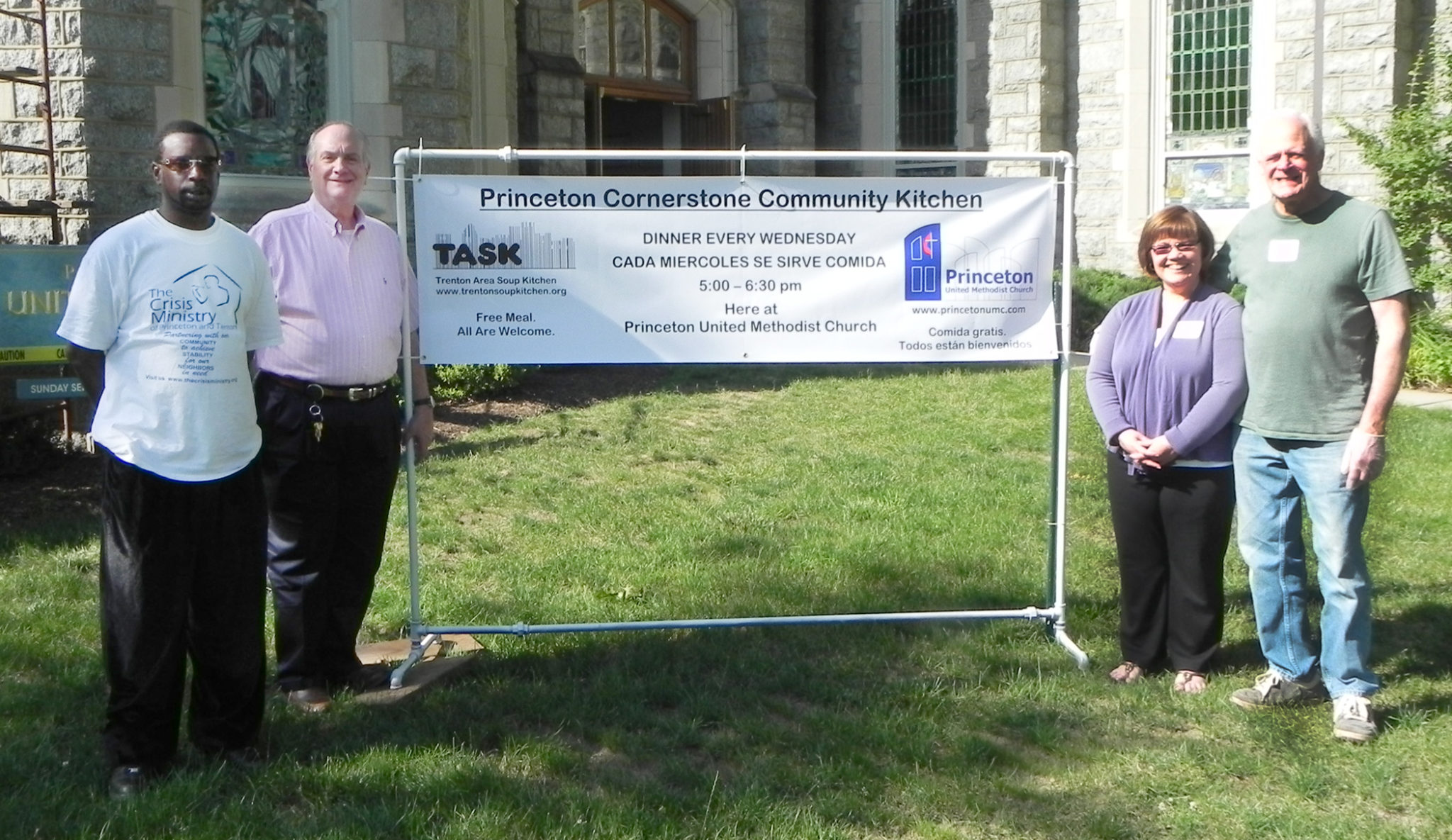 Seven Junes ago, Larry Apperson launched Princeton Cornerstone Community Kitchen at Princeton UMC, partnering with the Trenton Area Soup Kitchen (TASK) to serve over 100 meals weekly, on an unconditional, no-questions asked basis. Larry plants the “Free Meals” banner on the lawn every Wednesday.
Seven Junes ago, Larry Apperson launched Princeton Cornerstone Community Kitchen at Princeton UMC, partnering with the Trenton Area Soup Kitchen (TASK) to serve over 100 meals weekly, on an unconditional, no-questions asked basis. Larry plants the “Free Meals” banner on the lawn every Wednesday.
Corn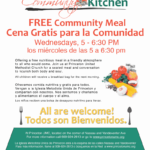 erstone Community Kitchen served its first meal on June 6, 2012. Some come for the free food, some for the fellowship, all are graciously served a hot meal complete with a decorated table and a piano player in the background. TASK delivers the main dish but CCK supplies vegetables, salad, bread, and a drink, plus sandwiches, children’s breakfast bags, and produce to take home.
erstone Community Kitchen served its first meal on June 6, 2012. Some come for the free food, some for the fellowship, all are graciously served a hot meal complete with a decorated table and a piano player in the background. TASK delivers the main dish but CCK supplies vegetables, salad, bread, and a drink, plus sandwiches, children’s breakfast bags, and produce to take home.
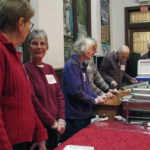 For the first two years meals were served on paper plates with plastic utensils in the Sanford Davis Room, the church “parlor” with stained glass windows, because the kitchen — which did not meet health codes — was being constructed. Now the meals are prepared in an up-too-date catering kitchen and served on china plates in the renovated Fellowship Hall.
For the first two years meals were served on paper plates with plastic utensils in the Sanford Davis Room, the church “parlor” with stained glass windows, because the kitchen — which did not meet health codes — was being constructed. Now the meals are prepared in an up-too-date catering kitchen and served on china plates in the renovated Fellowship Hall.
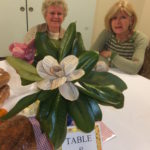 “The greatest unexpected pleasure that’s come from our service has been the coming together of people from throughout the community to serve,” says Larry Apperson. Five teams from Princeton United Methodist Church alternate serving the meals, one week a month.
“The greatest unexpected pleasure that’s come from our service has been the coming together of people from throughout the community to serve,” says Larry Apperson. Five teams from Princeton United Methodist Church alternate serving the meals, one week a month.
Now, each week, Cornerstone’s opening on Wednesday night and its related offerings depend on some 30 volunteers and approximately 75 hours of volunteer time.
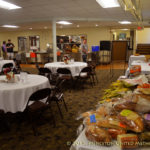 Cleanup is done almost exclusively by church members. Every week PUMC member jobs include playing the piano, setting and decorating tables, running the clothes closet, and washing the pots. One school-age girl helps, with her grandmother, before and after her PUMC choir practice. Judy Miller works Tuesday and Wednesdays — she runs the Clothes Closet with the help of two PUMC volunteers. She also decorates the tables with flowers and props from her personal trove.
Cleanup is done almost exclusively by church members. Every week PUMC member jobs include playing the piano, setting and decorating tables, running the clothes closet, and washing the pots. One school-age girl helps, with her grandmother, before and after her PUMC choir practice. Judy Miller works Tuesday and Wednesdays — she runs the Clothes Closet with the help of two PUMC volunteers. She also decorates the tables with flowers and props from her personal trove.
Community members can also sign up online for ‘one-time’ service. “I wanted to create a place where people could go to do the good things they deep down feel they should be doing anyway,” says Apperson. “Volunteering would be easy, no homework, just come and do it.”
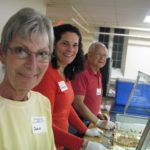 PUMC members supporting CCK include Pam and Tim Ewer, Charles Phillips, Karen Longo-Baldwin, Karin and Bernhard Brouwer (just moved to Florida), Susan Davelman, Joan and Bob Nuse, Judy Miller, Ed Sproles, Lula Crawford, Francia Francisco, Doug Fullman, Larry and Emily Gordinier, Lori Pantaleo, Valerie Newhall, Lorie Roth, Yvonne Macdonald, Joan Klass, Larry and Helen Curtis, Karen Johnson, Bruce Henry, Chris Cox, Kate Lasko, Ichen Mei, and some young new arrivals, Alex and Izzy DiStase.
PUMC members supporting CCK include Pam and Tim Ewer, Charles Phillips, Karen Longo-Baldwin, Karin and Bernhard Brouwer (just moved to Florida), Susan Davelman, Joan and Bob Nuse, Judy Miller, Ed Sproles, Lula Crawford, Francia Francisco, Doug Fullman, Larry and Emily Gordinier, Lori Pantaleo, Valerie Newhall, Lorie Roth, Yvonne Macdonald, Joan Klass, Larry and Helen Curtis, Karen Johnson, Bruce Henry, Chris Cox, Kate Lasko, Ichen Mei, and some young new arrivals, Alex and Izzy DiStase.
In addition, the Clothing Store operates in a spacious, dedicated room and shares the same Wednesday 5 – 6:30 PM hours of operation. Supervised by Judy Miller, the store is filled with a wide variety of neatly organized and displayed clothing and household items, where guests take turns shopping in small groups. Store volunteers manage seasonal programs for the children — selecting back to school backpacks, Halloween costumes, and Christmas gifts – carefully selected to match the child’s age and gender.
A significant number of the guests are Hispanic and some speak little if any English. Three years ago, PrincetonUMC member Karen Longo Baldwin, a certified ESL teacher, began teaching English as a Second Language classes that now meet four times weekly.
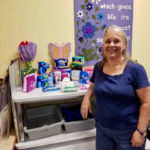
Cornerstone’s newest offering is Princeton Period Project, a community program to help girls and women who don’t have an easy, reliable, affordable access to feminine hygiene products. These products often take second seat to providing food at the family table. “We have already provided more than 51,000 feminine hygiene products to girls and women in the area,” says Gil Gordon, a member of the Jewish Center of Princeton and member of the board.
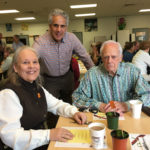
Earlier this year, the Trenton Area Soup Kitchen (TASK) presented Larry Apperson with the Chuck Inman Memorial Award, honoring an individual who has made a significant impact in feeding hungry people in Mercer County.
Pastor Ginny Cetuk, who chairs the CCK board, points out that — for a minimum wage job in Mercer County, one would need to work 130 hours per week in order to make ends meet.
As a 501c3 nonprofit organization, Cornerstone does not aim to deliver a religious message. “We are witnessing to our faith through our actions,” says Larry.
Written by Barbara Fox

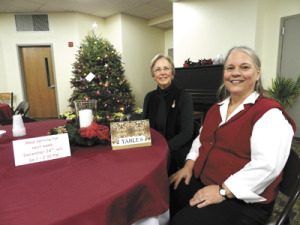 West Windsor Plainsboro News, the biweekly paper, celebrated Cornerstone Community Kitchen volunteers Annette Ransom (left in this WWP photo), Judy Miller (on the right) and Chris Orsini (pictured below, in action, wrapping take-home meals).
West Windsor Plainsboro News, the biweekly paper, celebrated Cornerstone Community Kitchen volunteers Annette Ransom (left in this WWP photo), Judy Miller (on the right) and Chris Orsini (pictured below, in action, wrapping take-home meals).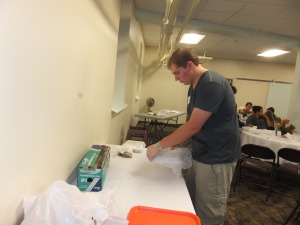 Thanks to all the volunteers who help Cornerstone Community Kitchen, to partner with TASK to serve meals every Wednesday since June 6, 2012. This year, it will offer its New Year’s Eve meal at a different time — 1 to 2:30 p.m.
Thanks to all the volunteers who help Cornerstone Community Kitchen, to partner with TASK to serve meals every Wednesday since June 6, 2012. This year, it will offer its New Year’s Eve meal at a different time — 1 to 2:30 p.m.
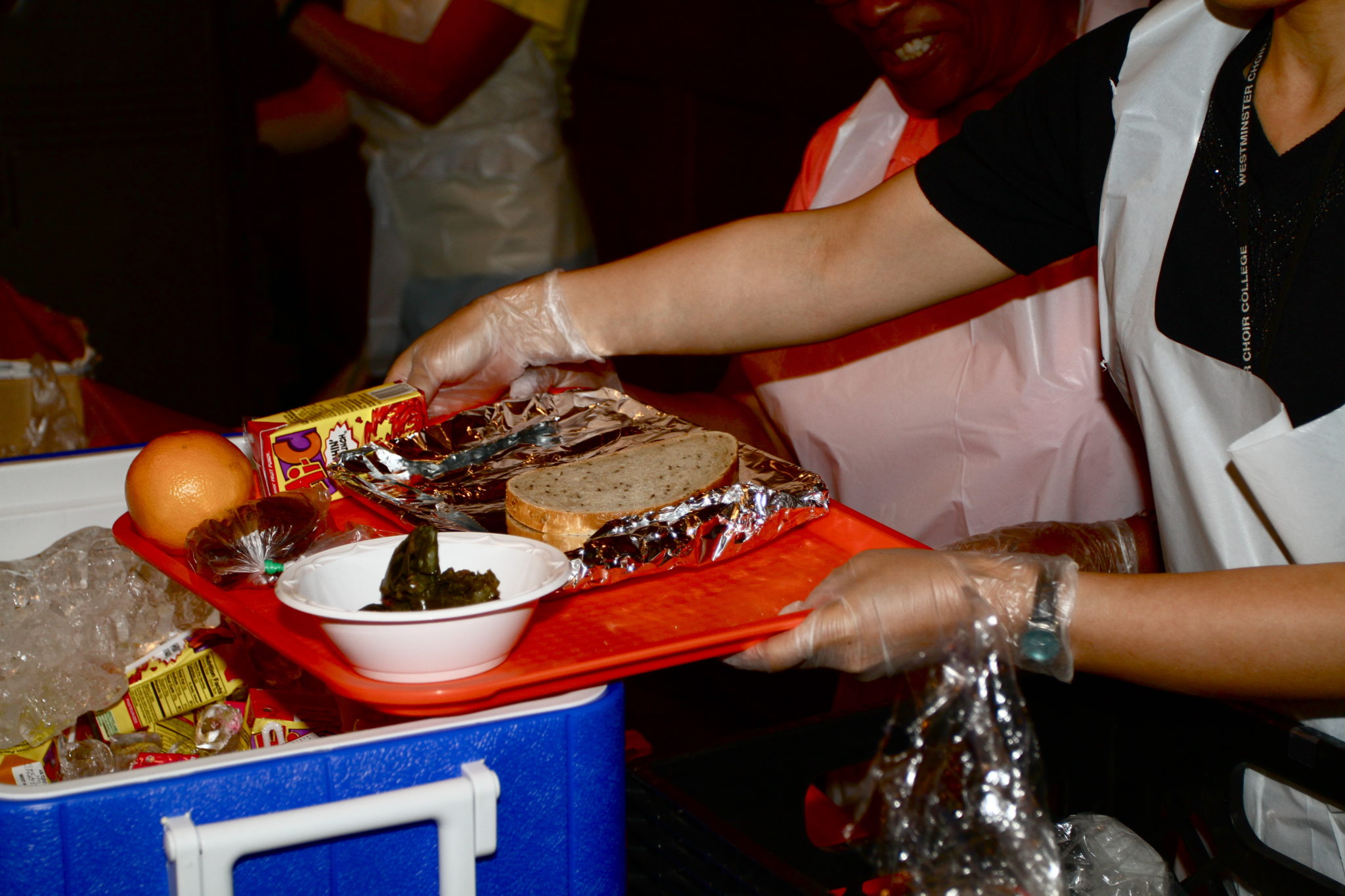 PUMC volunteers have been serving at TASK in Trenton for two decades, but last June the church and TASK began a new partnership to serve meals in Princeton to more than 50 people every Wednesday. Some come for the food, some for the fellowship, and dozens of volunteers from both the church and the community are helping. TASK cooks most of the meals but outside organizations (the restaurant Zorba’s Brother cooked a turkey dinner last month) have also contributed. TASK has a similar partnership in Hightstown.
PUMC volunteers have been serving at TASK in Trenton for two decades, but last June the church and TASK began a new partnership to serve meals in Princeton to more than 50 people every Wednesday. Some come for the food, some for the fellowship, and dozens of volunteers from both the church and the community are helping. TASK cooks most of the meals but outside organizations (the restaurant Zorba’s Brother cooked a turkey dinner last month) have also contributed. TASK has a similar partnership in Hightstown.
